Egypt's new govt faces tough test
Updated: 2011-12-18 07:47
(Xinhua)
|
|||||||||||
CAIRO - The Egyptian new government faces a tough test after taking office only 10 days ago, as fresh clashes between protesters and security forces in Cairo continued on Saturday.
Late Saturday, the health ministry said 10 had been killed and 432 others injured in the clashes since Friday.
Prime Minister Kamal el-Ganzouri expressed at a press conference on Saturday the cabinet's deep sorrow over the incidents and condemned the acts of setting a research building ablaze by protesters on Saturday morning.
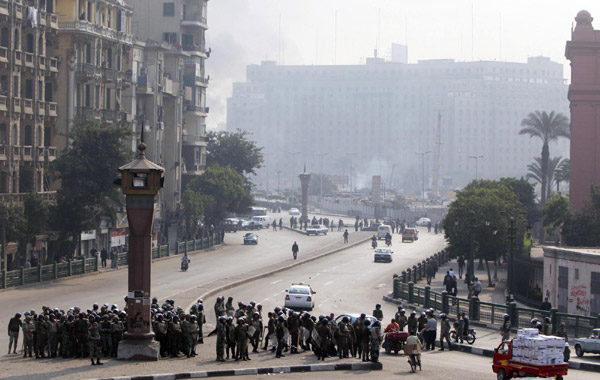 |
|
Army soldiers stand guard after clashes with protesters as smoke is seen in the background at Tahrir Square in Cairo December 17, 2011. [Photo/Agencies] |
The armed forces managed to extinguish the fire and secure the neighboring building of the People's Assembly (lower house of parliament).
"The protesters lacked any sense of responsibility regarding the preservation of historical and civilization heritage," Ganzouri added.
The government will closely follow the perpetrators of violations against the homeland and the people, he added.
Ganzouri denied security forces had opened fire against protesters. "Those who are in Tahrir Square are not the youth of the revolution," he said.
In a statement, the ruling Supreme Council of the Armed Forces (SCAF) also expressed deep sorrow and resentment over the recent events in downtown Cairo that caused casualties and damage in private and public buildings.
"All the necessary procedures to urgently stop the violence among the protesters and security elements have been taken," it said. The SCAF has ordered the establishment of a concrete barrier to secure public buildings.
The statement said compensation should be immediately paid for the families of the dead, and that the SCAF hospitals are well prepared to receive the injured.
The concerned investigation bodies will take the necessary procedures to determine the reasons behind the clashes and announce the results, the statement added.
The public prosecution ordered 16 people to be held in custody over the incidents, official new agency MENA reported. They faced charges of resisting authorities, setting fire to government buildings and damaging public and private properties.
The SCAF urged all classes and political movements to put the interests of Egypt first to pass this period of the nation's history and achieve the objectives of "January 25 protests."
Military police holding batons dispersed protesters camping in Tahrir Square on Saturday. Their tents were pulled down and burnt. Clashes continued in certain areas.
The protesters asked the newly appointed prime minister to resign and the SCAF to hand over power immediately to a civilian administration with full powers.
The 30-member advisory council, recently formed by the military council to provide advice in state affairs, demanded an immediate end to the violence, investigation into the violence and compensation for the casualties.
Several members of the advisory council have reportedly resigned over the incident.
Amr Moussa, a potential presidential candidate and former chief of the Arab League, suspended his participation in the advisory council until the demands to handle the crisis are met.
The latest clashes became a serious test for the new government to lead the country through the critical period. The ruling military council gave Ganzouri all presidential powers except for the affairs related to justice and national defense.
Ganzouri pledged to restore security and revive the shattered economy to meet the demands of the people. Ganzouri's predecessor, Essam Sharaf, resigned on November 20 under pressure from violent protests which left at least 42 dead.
"Some people do not want the security improvement over the past days to continue," Ganzouri said, adding that Egypt is going through a hard time which needs the unity of all political and youth groups.
The clashes occurred just after the second stage vote for the People's Assembly was held in nine provinces on Wednesday and Thursday. The landmark polls started its first stage vote on November 28.
The new violence cast a shadow over the elections, which will end in early March.
Hot Topics
HIV/AIDS, Egypt protest, Thanksgiving, climate change, global economic recovery, home prices, high-speed railways, school bus safety, Libya situation, Weekly photos
Editor's Picks
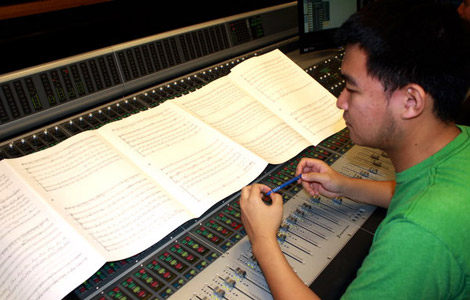
|
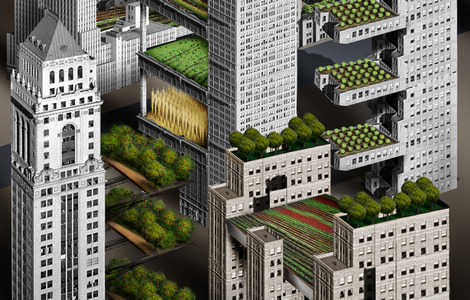
|
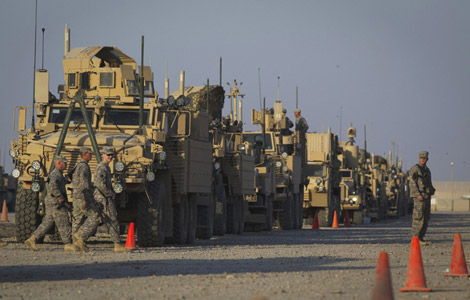
|
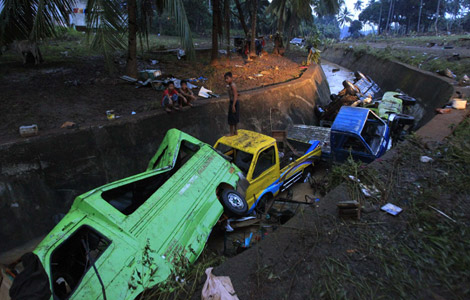
|

|

|







